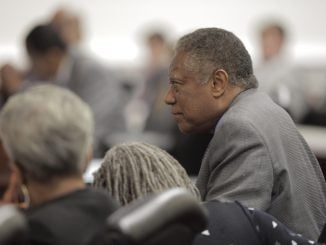
RALEIGH — The joint redistricting committee convened for the second time Friday, after having received further instruction from courts in the form of a Sept. 1 deadline for new legislative maps. With the hastened schedule, committee members offered suggestions for the use of specific criteria and also heard input from nearly 50 members of the voting public on what they think should guide the process.
Key Democrats offered their criteria and commentary during a press conference preceding the meeting, arguing that while leaps in technology have made gerrymandering more effective, technology should also be used to ensure fair maps are drawn.
“Attorneys defending the current maps said they’re serious about remedying this and creating a constitutional map, and we’re here today to help them create a constitutional map,” said Senate Democratic Leader Dan Blue (Wake). “Up to this point the actions taken by the [Republican] majority don’t instill a lot of faith in their sincerity in bringing these legislative maps in compliance with the law.”
Sen. Ben Clark (D-Cumberland) presented a list of suggested criteria to be used in the redistricting process that he said would ensure better representation for North Carolina voters.
“When the redistricting committee meets today it should receive in good faith recommendations of the citizens that will speak,” said Clark. “It should do so in order to foster a set of criteria, or establish a set a of criteria that will enable us to put together fair maps that represent the state and citizens of North Carolina.”
Clark went on to say that, despite current maps being thrown out for unconstitutional racial considerations, the redrawing effort should not pursue partisan advantage either. Instead, redistricting should aim to “establish partisan symmetry.”
The list of criteria presented by Clark aimed to employ analysis to achieve said symmetry.
“These tools include things such as efficiency gap analysis and mean-median vote analysis,” said Clark. “We should implement these tools, make them part of our toolkit, so we can ensure that what we do here at the end provides fair maps for all North Carolinians.”
The Democratic lawmakers faced questions related to past gerrymandering by their own party when in power. Their responses ranged from “two wrongs don’t make a right” to explaining how new technologies make the issue worse under Republicans.
“People forget that we did some gerrymandering also, which you say was wrong, but look at the difference,” said Rep. Henry Michaux (D-Durham). “When we did the last one which was in 1990, we ended up with seven Democratic congressmen and six Republicans — not the 10 and three situation that we have now. … Even though you said we gerrymandered, our gerrymandering wasn’t anything near what you see here today. We were at least fair in our gerrymandering, if you want to call it that.”
Sen. Terry Van Duyn (D-Buncombe) offered the proliferation of candidates with no opposition as evidence that today’s gerrymandering is worse than Democrats’ past efforts to shape districts.
“The question that I get asked when I go out on the issue of gerrymandering is, isn’t it true that Democrats did it, now Republicans did it, and yes that is absolutely true, but nevertheless we have gotten to a point now where our districts no longer represent the actual make up of North Carolina,” said Van Duyn. “My district is a perfect example. In 2016 I did not have a Republican opponent, and that means that a significant part of my district, a significant number of people in my district, had no one to vote for and that is fundamentally undemocratic.”
During the committee meeting lawmakers heard from citizens suggesting that partisan statistics, demographics and race should not be considered at all in the redistricting process. Instead, many public voices offered geography and population as the only necessary inputs for drawing new maps, while also advocating for an independent, nonpartisan body to handle redistricting after every census.
The vast majority of comments came from those opposed to the Republican legislative majorities and the maps they constituted, often citing an alleged imbalance between total Democratic votes and the ultimate number of legislative wins by Democrats in the 2016 election.
Pushing back against that line of attack during public comment was Dallas Woodhouse, executive director of the N.C. Republican Party.
“The use or discussion of statewide election data is completely irrelevant even though it is largely favorable to the North Carolina Republican Party that has won overwhelming amount of the statewide elections races in the past six years,” said Woodhouse. “It is not the job of this committee to make a political party that lost 76 North Carolina counties in the [2016] presidential election competitive because they are uncompetitive in vast areas of the state. The minority party in this body has a geographic problem that is has to correct, and it is not the job of this committee to correct it.”
Woodhouse also suggested that “no racial considerations ought to be made” in the redistricting process.



